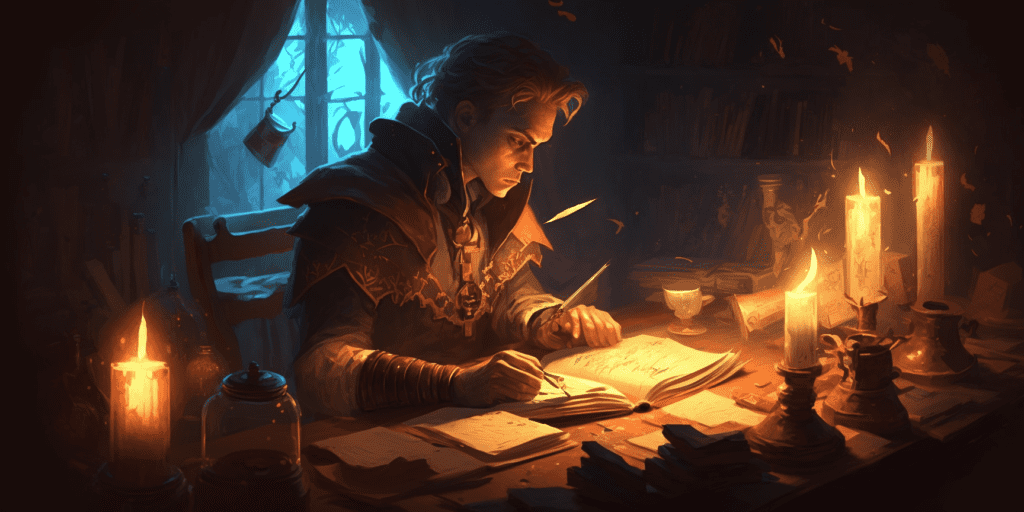Many players who want to get into DnD feel intimidated at first. Yeah, character creation is cool, and the killing monsters bit is fine, but the roleplaying itself feels a bit scary.
If you’re one of those people or just someone who wants to improve at roleplaying, read this article. I’m certain that it’ll help you improve in no time. So, how does one roleplay better in DnD?
There are a lot of things you can do to become better at roleplaying in DnD. Try creating comprehensive background lore for your character, and furthermore, don’t make the character flawless. Another important thing to keep in mind when trying to become better at roleplaying is that it takes time, and no one goes from beginner to expert level in anything.
Even though there are a lot of things you can do to become better, incorporate them one at a time. Read more to find out everything about becoming better at roleplaying in DnD.

1. Don’t Overcomplicate Things in the Beginning
You might have seen podcasts, playthroughs, or something along those lines, where professional actors are playing DnD campaigns. Watch-alongs like these are awesome and all, but you shouldn’t try to jump from beginner player level to that level immediately.
It’s unrealistic to go from beginner level to expert level in any field, period. Don’t overcomplicate things. Make a character that’s similar to yourself, instead, or a character that you feel fits your personality.
This way, you will be able to roleplay on a pretty authentic level despite not having that much experience. You don’t have to do voices or anything like that. That comes later, if you want to.
2. Take Inspiration From Professionals
While you shouldn’t try to translate previously mentioned streams and videos directly to your roleplay, you can take inspiration from those things. Don’t incorporate everything at the same time, however. Instead, include what you find fitting for yourself, piece by piece.
This will also help you see the potential of what can come of extensive roleplaying. Some experienced DnD players are absolutely fantastic to watch and listen to.
As a general rule, taking inspiration from other places can be a very good idea in DnD. This goes for creating a character persona, crafting new campaigns, and more. Don’t hesitate to take inspiration from mythology, fictional characters, and history.
Related Article: How to Come Up With DnD Campaign Ideas
3. Narrate the Character’s Actions
Many players think it’s uncomfortable to go into a direct first-person perspective when roleplaying, and that’s understandable. It’s almost like acting that way.
Roleplaying isn’t the same as acting, though, and you don’t have to play your character from a first-person perspective. Instead, try roleplaying from a third-person perspective.
See it as narrating your character’s actions. This way, you get some psychological distance from your character, and you don’t have to feel pressure to do something along the lines of a voice.
You can still provide authentic reactions with this style. Try to think about what your character would feel about situations that happen, based on things like backstory and personality.
4. Background Lore is Important
Background lore can help you roleplay better almost instantly. It’s like a cheat sheet. Some people like to have shorter backgrounds, and others like them really mapped out.
In this regard, it’s a matter of preference. However, everyone has at least a short backstory to make them get into the character. Even if you’re really into improvisation, a short background story can help steer you in certain directions.
For beginners, it’s almost always a good idea to have pretty worked-out background lore. Remember, the lore itself can come from your imagination, so it’s not like you’re just reading off of a generic script.
For example, imagine a scenario where a character has gone through some horrible trauma in his past. If presented with situations similar to what caused this trauma, he might react in an erratic and impulsive manner, even if he is calm and calculating most of the time.
Stuff like this can add wonderful and unexpected flavor to situations, and it’s almost given to you by the way of your background lore.
Finally, it can be a good idea to have some of your background lore hidden. Having all of your background mapped out can restrict character development, but keeping parts of your story unknown can provide great opportunities to learn as you go.
5. Try to Imagine What Your Character is Experiencing
Above, I touched briefly on trying to get into the head of your character. This may seem obvious to you, but many people just kind of autopilot once they start playing.
By trying to empathize with your character, you can really get a connection to it and provide authentic moments. A lot of people find this sort of conscious thinking helpful when playing long sessions, too.
By thinking about the nature of your character, you won’t get as restless or distracted. If you’re in the mind of your character for most of the session, reactions and dialogue will come easier to you. Of course, this is a matter of practice, and it’ll get easier and easier over time.
6. Don’t Be Flawless
It might seem ironic but in the fantasy world of DnD, realism is key to making your character seem authentic. No real person is flawless, so your character shouldn’t be, either.
In fact, you should design purposeful flaws for your character to make it more well-rounded. It ties into a point I touched on earlier. A traumatic past can be a practical flaw for your character, but it’s also great material for roleplaying.
Not being flawless also involves doing things that, you as a real person, know will have negative consequences. Remember, however, that it’s not you in the game, it’s your character, and your character might not always be rational when presented with certain situations.
Related Article: How Do I Make My DnD Character More Interesting?
7. Don’t Be Selfish
Don’t see yourself as the perpetual main character. This will serve to annoy and discourage your party members from taking a meaningful part in the game. See the group, as a whole, as the main character of the story instead.
Don’t worry, with a competent DM and a well-balanced party, every character will get their time to shine, and when that time comes for you, it’ll be more special. These moments can provide wonderful opportunities for roleplaying.
Roleplaying largely involves facilitating other party members. This in turn will provide both you and your friends with authentic moments.
8. Stick to Your Alignment
Alignments in DnD are, as you probably know, a character’s personal and moral standpoints. There are nine of them in total. You should, in my opinion, pick an alignment and stick to it.
Alignments provide loose guidelines for your character. For example, a character that has a lawful good alignment would react to moral dilemmas in a different manner to a character who’s chaotic neutral or lawful evil.
DnD is not only about overcoming challenges, it’s about failing them in an authentic manner. It wouldn’t be satisfying for anyone in a party if all of a sudden, a lawful good cleric decided that a deal with a demon is a reasonable thing to do to progress an adventure.
It would be more memorable to everyone playing if the cleric suffered irreparable harm or even died trying to stop an evil force because that’s more authentic to the character.
9. Interact With Other Players
It’s essential to interact with other players, and a lot of new players do not think about this enough. In the beginning, it’s easy to forget that you can interact with companions and not only NPCs.
If you’re hanging out in a tavern, chit-chat with other players. Doing this will develop the relationships between you and can even create new and unexpected storylines.
We small-talk all the time in real life, and remember, roleplay is really good when it’s authentic.
10. Prepare For Sessions Beforehand
If you really want to impress your buddies, you can prepare a bit before going to a session of DnD. It doesn’t have to be for hours on end, just put aside 20 minutes of time where you think about possible scenarios and how your character would react to those scenarios.
Practice how your character would react, and what you would say in situations that might occur. Even if you prepared situations that won’t come up when playing, you’ll get a better feel for who your character is.

